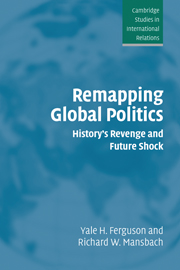Book contents
- Frontmatter
- Contents
- Preface
- Acknowledgments
- 1 Postinternational politics
- 2 Theory and method
- 3 Political space and time
- 4 States and other polities
- 5 Identities in a postinternational world
- 6 A postinternational world economy
- 7 War in a postinternational world
- 8 Technology and change
- 9 The future
- Index
- CAMBRIDGE STUDIES IN INTERNATIONAL RELATIONS
6 - A postinternational world economy
Published online by Cambridge University Press: 22 September 2009
- Frontmatter
- Contents
- Preface
- Acknowledgments
- 1 Postinternational politics
- 2 Theory and method
- 3 Political space and time
- 4 States and other polities
- 5 Identities in a postinternational world
- 6 A postinternational world economy
- 7 War in a postinternational world
- 8 Technology and change
- 9 The future
- Index
- CAMBRIDGE STUDIES IN INTERNATIONAL RELATIONS
Summary
One consequence of the rapid transformation of global society at millennium's end has been to alter dramatically the relationship between territorial states and economic markets. As in other spheres of global life, the interstate system of exclusive territorial control is being buffeted by the deterritorialized logic of regional and global markets. More and more states, regardless of history or culture, are privatizing government functions, deregulating major sectors of their economies, scaling down or reneging on welfare commitments, willingly and unwillingly tailoring their policies to the demands of intergovernmental and private financial institutions, and experiencing both bewilderment and policymaking gridlock in framing new rules for a highly unpredictable future. Meanwhile, globe-spanning transnational corporations (TNCs), like other restive polities with few territorial restraints, are challenging states for resources and legitimacy. Simply put: “Territoriality and production are no longer bound together.” Yet contemporary global political and economic worlds are not entirely old or new. Like all previous worlds, they are worlds in transition – the main difference, whatever the benchmarks, is the sheer pace of change.
Changes both in what Charles Tilly calls “big structures” and “large processes” have profound consequences for scholars as well as for practitioners and individuals. For scholars, standard concepts and methodologies are less and less useful for explaining major events like the end of the Cold War, much less short-term phenomena like the current or likely future price of the dollar or the yuan.
- Type
- Chapter
- Information
- Remapping Global PoliticsHistory's Revenge and Future Shock, pp. 181 - 226Publisher: Cambridge University PressPrint publication year: 2004

